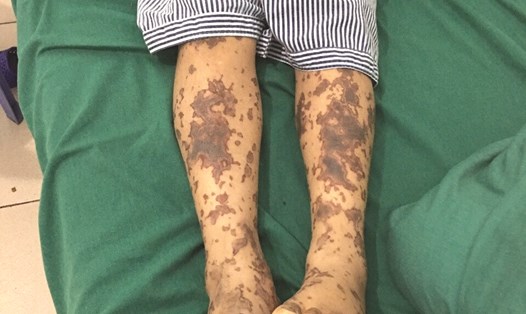Prolonged headache, all 3 discovered parasitic
Patient Q.V.T (51 years old) said that he started to have symptoms of headache, earaches, numbness in the wrists, nausea and continuous vomiting about a month before being admitted to the hospital. Despite being diagnosed with cat and dog stabbing worms and treated at a lower-level hospital, the symptoms did not subside. At the Central Hospital for Tropical Diseases, he underwent a bone marrow epidemic test and discovered a sharp increase inhanite white blood cells - a typical sign of parasitic infection. The results showed that he had meningitis due to both eel and cat-stabbed worms, which may be related to the habit of eating raw fish salad.
The second patient, Ms. B.T.Q (46 years old), also showed symptoms of headaches and fever at one time. Despite being treated at a provincial hospital for three weeks, the symptoms did not improve. At the Central Hospital for Tropical Diseases, her brain-ctrocution test results showed that her cell index skyrocketed to 2,458, protein increased many times compared to normal, andhania white blood cells accounted for 40%. Tests confirmed that she was infected with worms that stabbed cats and dogs, causing meningitis.
The third case was Mr. N.V.L (80 years old) who showed signs of mild fever, headache, nausea for three weeks, and had underlying hypertension and gout. After ineffective treatment at the provincial hospital, he was transferred to a higher level and was also determined to have worms that stabbed dogs and cats, causing meningitis.
Warning of the risk of infection from food and livestock
According to Dr. Le Van Thieu, Department of General Infection - Central Hospital for Tropical Diseases, eel and cat-stabbed worms can enter the human body through the digestive tract - usually from soil, sand or Larvae-infected food. Infections often progress silently, easily mistaken for flu, sinusitis or vestibular disorders. Once the Larvae enter the brain, liver or other organs, they can cause serious damage, even life-threatening if not diagnosed promptly.
Fortunately, all 3 patients responded well to the specific treatment regimen. After three days of using parasites combined with anti-inflammatory drugs, headache symptoms significantly decreased, the patient was alert and his health improved significantly.
Doctor Thieu recommends that to prevent the disease, people need to periodically exfoliate both humans and pets (an average of 6 months/time), keep dogs and cats properly and clean the living environment. Avoid eating fish salad, raw meat, unwashed raw vegetables, especially aquatic vegetables. Do not let dogs and cats roam freely, limit direct contact - especially with young children. At the same time, wash your hands thoroughly after contact with soil, sand or pets and before eating.
In case of prolonged headaches, mild fever, nausea of unknown cause, people should go to a medical facility with a specialty for early examination to be accurately diagnosed and treated promptly.




